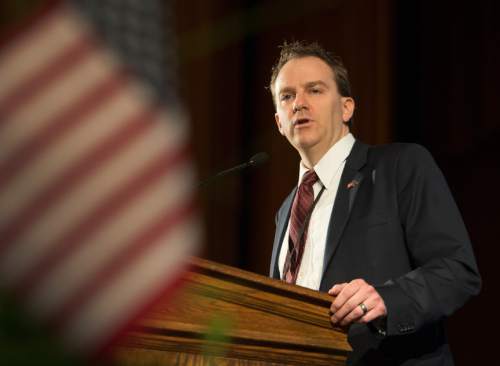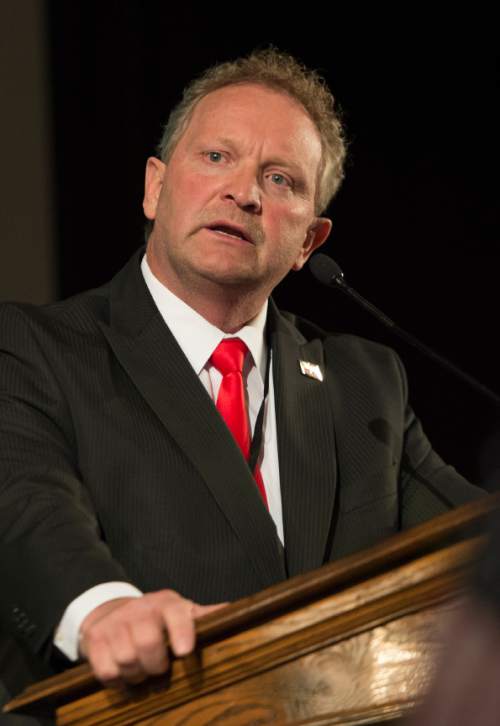This is an archived article that was published on sltrib.com in 2016, and information in the article may be outdated. It is provided only for personal research purposes and may not be reprinted.
South Jordan • Primary election rivals state Sen. Lincoln Fillmore and Rep. Rich Cunningham, both R-South Jordan, hold similar views on a lot of issues: they're against Common Core, favor the state taking control of millions of acres of federal lands and place education among their top priorities.
But when it comes to SB54 and how candidates are nominated they have a dramatic parting of the ways.
"It undermines democracy," Fillmore said during a Wednesday night debate, referring to the new law that allows a hopeful to gather signatures to get on a primary ballot.
The senator, who was elected by Republican delegates in District 10 to fill the vacant seat last December, again won the votes of 60 percent of delegates at the county GOP convention in April. Under the old rules, he would have secured the nomination with that convention victory.
But Cunningham, who finished with less than the 41 percent needed at convention, had already locked up a place on the primary ballot by gathering the 2,000 signatures required under SB54.
Fillmore said the new law creates a conflict of interest because it allows politicians — SB54 was approved by members of the Republican-controlled Legislature and Gov. Gary Herbert — to set the rules rather than parties. He also criticized Cunningham for hypocrisy because he voted against SB54, then used it to continue his Senate campaign.
Cunningham defended his gathering of signatures and said while he did oppose SB54, it is now the law of the land and he feels free to avail himself of it.
Besides, he said, community members were glad to be part of the process when he was collecting signatures and "The vote and voice of the people are the most critical things out there today."
The two-term House member says he continues to support the state Republican Party's right to challenge the law in court, which the GOP Central Committee recently indicated it would likely continue to do despite several defeats.
What Cunningham doesn't support and has previously complained about is that the county Republican Party has endorsed Fillmore, a break from tradition and longtime rules that precluded the GOP from taking sides before a primary.
—
Education • On the topic of education, both candidates during their debate at the Legacy Retirement Residence pledged their commitment to improving and supporting Utah schools. Both said they favored getting rid of Common Core, minimum grade-level standards for math and English.
"The federal government has no business bribing states to force them to choose a curriculum made by experts in D.C. The curriculum should be made locally," said Fillmore, a former teacher and now president of a charter school management company.
Cunningham, whose wife is a school teacher, said he constantly hears about problems with Common Core.
"We know our children better [at the local level]," said Cunningham. "There are 41 school districts in Utah, and they aren't the same. We need to get local control back."
—
Public lands • Both candidates agreed the state, not the federal government, should control public lands in Utah.
Fillmore noted that there are 37,000 acres of developable land remaining in Salt Lake County, and he compared that to the proposal for a 1.9-million acre Bears Ears National Monument in San Juan County, calling the idea is ludicrous.
Cunningham, who said he grew up in southeastern Utah, echoed the sentiment, saying he will continue fighting for state control of public lands because — he asserted — 95 percent of his constituents favor that action.





